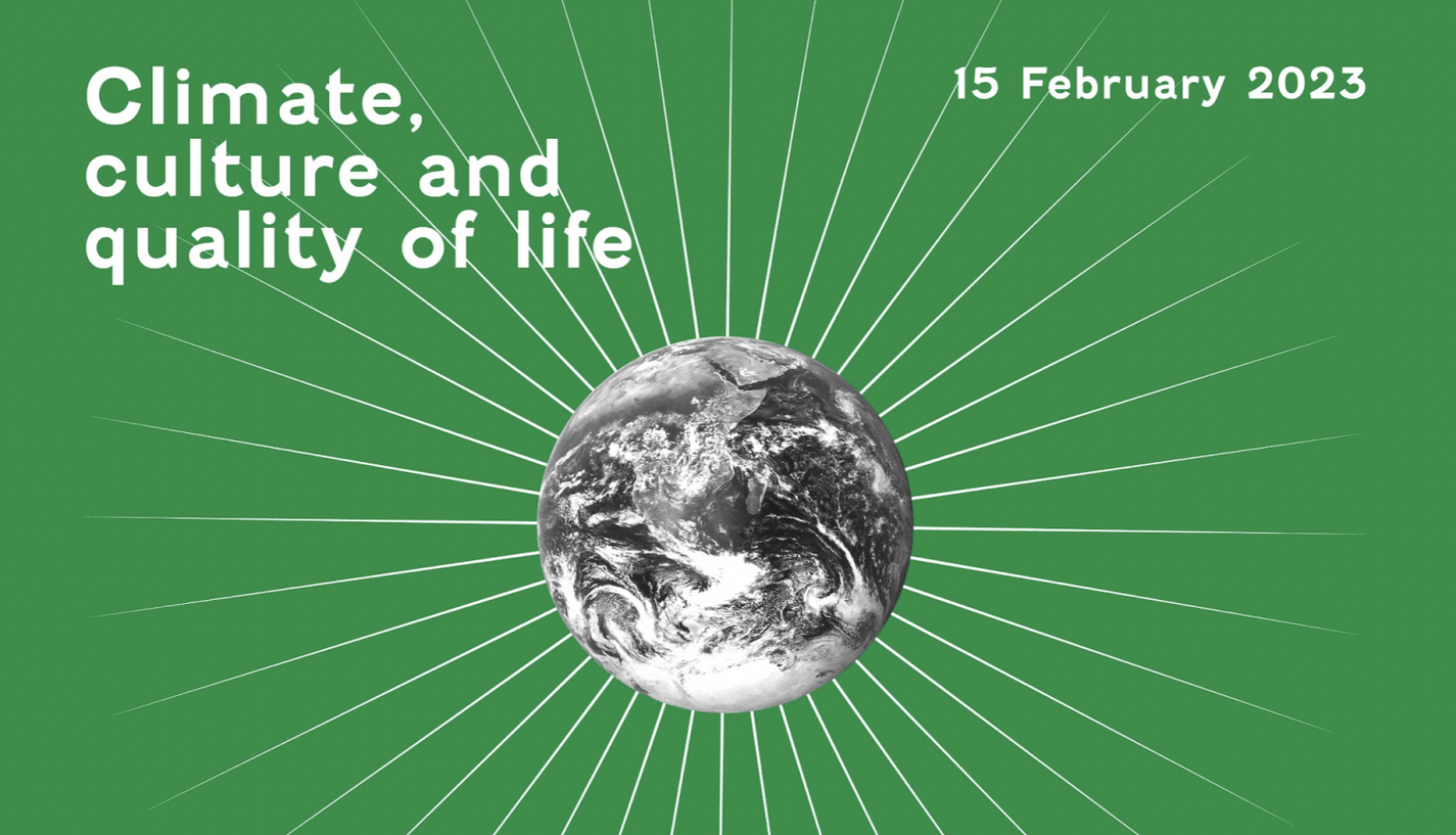Latvian and foreign experts specialising in culture and nature sciences, policy planners, and cultural heritage professionals gathered for an interdisciplinary seminar “Climate, Culture and Quality of Life” in Riga on 15 February to speak about the challenges raised by climate change and the role of culture in solving these challenges and improving the quality of life. The valuable conclusions from the seminar will contribute to various policies in the near future.
“In recent years we have seen the growing impact of climate change on cultural and natural heritage sites, including the World Heritage Sites, living heritage practices, and livelihoods in the cultural and creative industries. UNESCO research has shown that about 60% of Natural and World Heritage Sites are threatened by climate change and the associated severe weather. Yet, less discussed is the fact that culture is also a powerful and still untapped resource for climate change mitigation and adaptation. Living heritage practices can contribute greatly to environmental sustainability and serve as a source of resilience for communities in the face of climate-related disasters. Artists and cultural professionals play an essential role in encouraging climate action. Culture, and we all agree on this, is key to meeting the major challenges of our time, and climate change should not be an exception,” stressed UNESCO Assistant Director-General for Culture, Ernesto Ottone in his address.
The seminar agenda was split into four parts: “Climate and cultural policy”, “Climate and the cultural and historical environment”, “Climate, culture, and environment”, “Climate and intangible cultural heritage”. During the seminar, experts and specialists presented their opinions about culture and especially cultural heritage as a solution to climate-related challenges and argued for the necessity to come up with a comprehensive approach to climate change solutions not only in strategic documents but also in real life practices.
The European Cultural Heritage Green Paper, which implements the European Green Deal’s principles in the culture and cultural heritage sector, was presented by Sneška Quaedvlieg-Mihailović, the Secretary General of Europa Nostra, which is a European-wide network of cultural heritage experts. Ms Quaedvlieg-Mihailović pointed out that “cultural heritage is not only threatened by climate challenge but it is also a part of the solution.”
In the discussion about the correlation between construction, heritage and circular economy, Maija Katrīna Dambe, architect at “NOMAD architects” and guest lecturer at Vidzeme University of Applied Sciences, urged to shift from linear to circular economy, namely, to reuse as much as possible first and only recycle if reusing is not possible anymore. According to M. K. Dambe, “by applying the approaches of circular economy we can reach seven of the seventeen UN Sustainable Development Goals.”
Prof. Agrita Briede, Director of the Master Study Programme in Geography at the University of Latvia, spoke about climate change and its impact on the processes in nature and urban environment and marked one of the pronounced challenges in Latvia: “What disturbs us, and is also the most difficult to predict, is the extreme weather, for example the flood caused by intensive precipitation or heavy showers in urban settings.”
“Similarly to the awareness of cultural heritage values, also their evaluation and preservation will be of high importance in the coming years in order to promote responsible and inclusive attitudes towards the environment,” concluded the Secretary-General of the Latvian National Commission for UNESCO, Baiba Moļņika, and expressed her gratification that the seminar has encouraged professionals from various fields to think about the correlation between the culture and climate.
The participants concluded that culture, creative practices and preservation of cultural heritage can often offer answers to reducing the impact of climate change, strengthen the public resilience, and raise the quality of life.
In cooperation with the Faculty of Geography and Earth Sciences of the University of Latvia, a students’ workshop was organised in addition to the seminar. Students from the University of Latvia, Latvian Academy of Culture, and Latvia University of Life Sciences and Technologies worked according to a pre-designed methodology to draw their conclusions in seminar’s subjects and added their remarks concerning spreading the knowledge on climate and culture.
The opinions and ideas collected during the seminar will be of value for various policy makers, as they underline the need to adapt multilateral environmental, climate, culture, and energy perspectives to building integration policies and providing expertise; the necessity to preserve the cultural heritage and use the traditional and local knowledge systems in order to promote the implementation of the European Green Deal’s priorities; the role of culture and creative practices in research and innovations, education and training, and raising awareness of the contribution society and individuals can offer to reduce the impact of climate change; the significance of such educational approaches that foster change of lifestyle while supporting sustainable development models and are based on the principles of common responsibility; and the importance of engaging cultural heritage communities when planning local actions to address the challenges posed by climate change.
The seminar was organised by the Latvian National Commission for UNESCO, the Latvian National Heritage Board and ICOMOS Latvia together with the Education, Culture and Science Committee of the Saeima, the Social and Employment Matters Committee of the Saeima, the National Library of Latvia, the French Institute in Latvia, and the Faculty of Geography and Earth Sciences of the University of Latvia. The financial support is provided by the State Cultural Capital Foundation.




